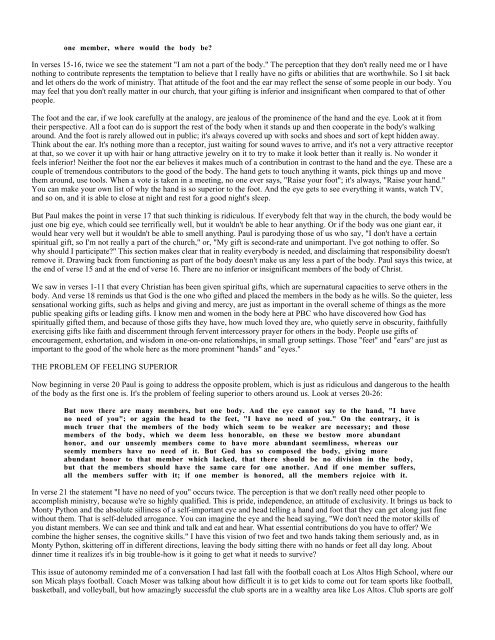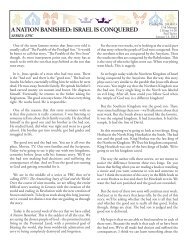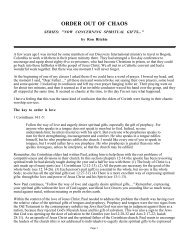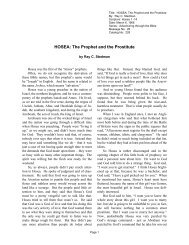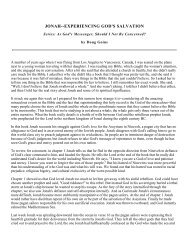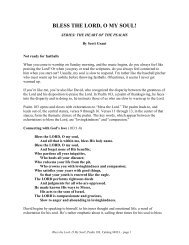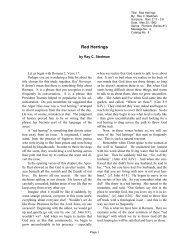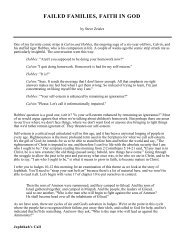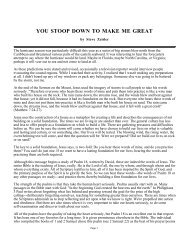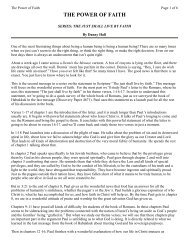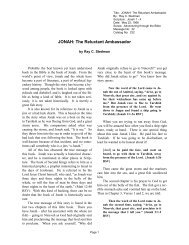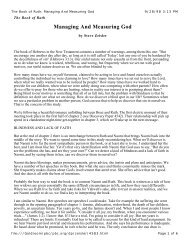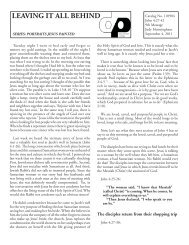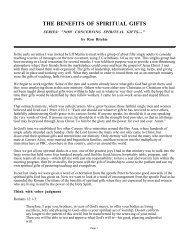Netscape: UNITY AND DIVERSITY IN THE BODY OF CHRIST
Netscape: UNITY AND DIVERSITY IN THE BODY OF CHRIST
Netscape: UNITY AND DIVERSITY IN THE BODY OF CHRIST
Create successful ePaper yourself
Turn your PDF publications into a flip-book with our unique Google optimized e-Paper software.
one member, where would the body be?<br />
In verses 15-16, twice we see the statement "I am not a part of the body." The perception that they don't really need me or I have<br />
nothing to contribute represents the temptation to believe that I really have no gifts or abilities that are worthwhile. So I sit back<br />
and let others do the work of ministry. That attitude of the foot and the ear may reflect the sense of some people in our body. You<br />
may feel that you don't really matter in our church, that your gifting is inferior and insignificant when compared to that of other<br />
people.<br />
The foot and the ear, if we look carefully at the analogy, are jealous of the prominence of the hand and the eye. Look at it from<br />
their perspective. All a foot can do is support the rest of the body when it stands up and then cooperate in the body's walking<br />
around. And the foot is rarely allowed out in public; it's always covered up with socks and shoes and sort of kept hidden away.<br />
Think about the ear. It's nothing more than a receptor, just waiting for sound waves to arrive, and it's not a very attractive receptor<br />
at that, so we cover it up with hair or hang attractive jewelry on it to try to make it look better than it really is. No wonder it<br />
feels inferior! Neither the foot nor the ear believes it makes much of a contribution in contrast to the hand and the eye. These are a<br />
couple of tremendous contributors to the good of the body. The hand gets to touch anything it wants, pick things up and move<br />
them around, use tools. When a vote is taken in a meeting, no one ever says, "Raise your foot"; it's always, "Raise your hand."<br />
You can make your own list of why the hand is so superior to the foot. And the eye gets to see everything it wants, watch TV,<br />
and so on, and it is able to close at night and rest for a good night's sleep.<br />
But Paul makes the point in verse 17 that such thinking is ridiculous. If everybody felt that way in the church, the body would be<br />
just one big eye, which could see terrifically well, but it wouldn't be able to hear anything. Or if the body was one giant ear, it<br />
would hear very well but it wouldn't be able to smell anything. Paul is parodying those of us who say, "I don't have a certain<br />
spiritual gift, so I'm not really a part of the church," or, "My gift is second-rate and unimportant. I've got nothing to offer. So<br />
why should I participate?" This section makes clear that in reality everybody is needed, and disclaiming that responsibility doesn't<br />
remove it. Drawing back from functioning as part of the body doesn't make us any less a part of the body. Paul says this twice, at<br />
the end of verse 15 and at the end of verse 16. There are no inferior or insignificant members of the body of Christ.<br />
We saw in verses 1-11 that every Christian has been given spiritual gifts, which are supernatural capacities to serve others in the<br />
body. And verse 18 reminds us that God is the one who gifted and placed the members in the body as he wills. So the quieter, less<br />
sensational working gifts, such as helps and giving and mercy, are just as important in the overall scheme of things as the more<br />
public speaking gifts or leading gifts. I know men and women in the body here at PBC who have discovered how God has<br />
spiritually gifted them, and because of those gifts they have, how much loved they are, who quietly serve in obscurity, faithfully<br />
exercising gifts like faith and discernment through fervent intercessory prayer for others in the body. People use gifts of<br />
encouragement, exhortation, and wisdom in one-on-one relationships, in small group settings. Those "feet" and "ears" are just as<br />
important to the good of the whole here as the more prominent "hands" and "eyes."<br />
<strong>THE</strong> PROBLEM <strong>OF</strong> FEEL<strong>IN</strong>G SUPERIOR<br />
Now beginning in verse 20 Paul is going to address the opposite problem, which is just as ridiculous and dangerous to the health<br />
of the body as the first one is. It's the problem of feeling superior to others around us. Look at verses 20-26:<br />
But now there are many members, but one body. And the eye cannot say to the hand, "I have<br />
no need of you"; or again the head to the feet, "I have no need of you." On the contrary, it is<br />
much truer that the members of the body which seem to be weaker are necessary; and those<br />
members of the body, which we deem less honorable, on these we bestow more abundant<br />
honor, and our unseemly members come to have more abundant seemliness, whereas our<br />
seemly members have no need of it. But God has so composed the body, giving more<br />
abundant honor to that member which lacked, that there should be no division in the body,<br />
but that the members should have the same care for one another. And if one member suffers,<br />
all the members suffer with it; if one member is honored, all the members rejoice with it.<br />
In verse 21 the statement "I have no need of you" occurs twice. The perception is that we don't really need other people to<br />
accomplish ministry, because we're so highly qualified. This is pride, independence, an attitude of exclusivity. It brings us back to<br />
Monty Python and the absolute silliness of a self-important eye and head telling a hand and foot that they can get along just fine<br />
without them. That is self-deluded arrogance. You can imagine the eye and the head saying, "We don't need the motor skills of<br />
you distant members. We can see and think and talk and eat and hear. What essential contributions do you have to offer? We<br />
combine the higher senses, the cognitive skills." I have this vision of two feet and two hands taking them seriously and, as in<br />
Monty Python, skittering off in different directions, leaving the body sitting there with no hands or feet all day long. About<br />
dinner time it realizes it's in big trouble-how is it going to get what it needs to survive?<br />
This issue of autonomy reminded me of a conversation I had last fall with the football coach at Los Altos High School, where our<br />
son Micah plays football. Coach Moser was talking about how difficult it is to get kids to come out for team sports like football,<br />
basketball, and volleyball, but how amazingly successful the club sports are in a wealthy area like Los Altos. Club sports are golf


